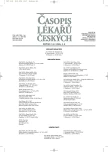-
Medical journals
- Career
The Risk of Malignancy After Organ Transplantation
Authors: R. Gürlich 1,2; J. Novotný 3; I. Stříž 4; E. Honsová 5; M. Oliverius 1; L. Janoušek 1; E. Pokorná 6; P. Maruna 7
Authors‘ workplace: Klinika transplantační chirurgie IKEM, Praha 1; I. chirurgická klinika 1. LF UK a VFN, Praha 2; Onkologická klinika 1. LF UK a VFN, Praha 3; Oddělení klinické imunologie1. LF UK a VFN, Praha 4; Pracoviště klinické a transplantační patologie1. LF UK a VFN, Praha 5; Transplantcentrum IKEM, Praha 6; Ústav patologické fyziologie 1. LF UK, Praha 7
Published in: Čas. Lék. čes. 2005; 144: 597-600
Category: Review Article
Overview
Improvements in immunosuppressive therapy during the past decade brought about improvements of the long term tolerance of organ allografts. However, the long-term immunosuppressive therapy has an important limitation, because it can increase the risk of cardivascular diseases, infections and tumors. As compared with age-matched healthy population, organ-transplant recipients have an increased incidence of tumors.
Key words:
immunosuppression, tumor, transplantation.
Labels
Addictology Allergology and clinical immunology Angiology Audiology Clinical biochemistry Dermatology & STDs Paediatric gastroenterology Paediatric surgery Paediatric cardiology Paediatric neurology Paediatric ENT Paediatric psychiatry Paediatric rheumatology Diabetology Pharmacy Vascular surgery Pain management Dental Hygienist
Article was published inJournal of Czech Physicians

-
All articles in this issue
- Tuberculosis in the Czech Republic in the Year 2004
- Shared Pathogenesis of Infectious and Cardiovascular Diseases – Year 2005´s View
- The Risk of Malignancy After Organ Transplantation
- Treatment of the Unresectable Non Small Cell Lung Carcinoma
- Role of Intestine in Immunity Mechanisms
- Intestinal Ischemia Represents Serious Surgical Problem
- Percutaneous Vertebroplasty
- Neuronal Network
- Differential Diagnosis of Peripheral Neuropathy
- Bortezomib (Velcade) in Relapsed/Refractory Multiple Myeloma The First Experience in the Czech Republic
- Latex Allergy – Report on Two Cases
- Czech Medical Doctors and World No Tobacco Day on May 31, 2005
- From the History of Endocrinology: Reminiscence of the Discovery of Adrenocortical Hormones
- Journal of Czech Physicians
- Journal archive
- Current issue
- Online only
- About the journal
Most read in this issue- Latex Allergy – Report on Two Cases
- Differential Diagnosis of Peripheral Neuropathy
- From the History of Endocrinology: Reminiscence of the Discovery of Adrenocortical Hormones
- Intestinal Ischemia Represents Serious Surgical Problem
Login#ADS_BOTTOM_SCRIPTS#Forgotten passwordEnter the email address that you registered with. We will send you instructions on how to set a new password.
- Career

